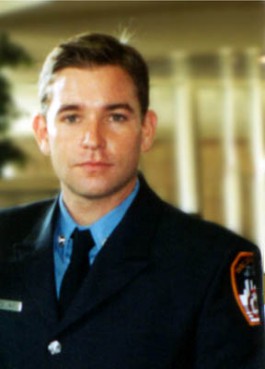
(RNS1-MAY22) Christian Regenhard was a probationary firefighter who was killed in the 9/11
attack on the World Trade Center. His remains were never found. His mother, Sally, is now part of
a suit alleging that the inability to have a funeral violates her constitutional rights of religious
exercise. For use with RNS-911-FAMILIES, transmitted May 22, 2008. Religion News Service
photo courtesy Sally Regenhard.
(RNS) Charging that its constitutional due process and religious freedom rights have been violated, a group of families of 9/11 victims has asked the Supreme Court to force New York City to move more than a million tons of World Trade Center debris from atop a garbage heap at a nearby landfill.
The group, known as the WTC Families for Proper Burial, says it is unacceptable that even the unidentified remains of victims, mingled with the Trade Center debris, should remain atop household trash.
After being rejected by a federal judge and an appellate court in a lawsuit seeking to force the city to move the debris, the WTC Families are asking the Supreme Court to decide the case.
The city has rejected the WTC Families’ assertions as untrue and says it intends to file a response, laying out for the justices why they should not hear the case.
If the petition is granted, legal experts say it would be the first time the Supreme Court weighs in on the emotionally charged issue of the Trade Center victims’ remains.
The group’s lawyer, Norman Siegel, said the case also could settle an important legal issue regarding the rights of next of kin over remains that have not been identified individually but are known to be those of an identified group.
The issue is particularly relevant, Siegel said, in the post-9/11 age, when the possibility of mass terror attacks is all too real.
Various courts have recognized some rights for next of kin over remains; the WTC Families group says those rights were denied by the city’s decision to leave the remains amidst more than a million cubic yards of World Trade Center debris at the Fresh Kills landfill.
The suit also asserts that, because burial is a fundamental aspect of religious expression, the city’s decision amounts to a denial of the group’s religious freedom under the First Amendment.
“Family members of those who were killed have been unable, for almost nine years, to recover, bury and commune with the remains of their children, spouses and kin in accordance with any standard of decency or tenet of religious faith,” the petition reads.
Asked to comment on the petition, the city’s law department issued a statement from Kenneth Becker, chief of the department’s World Trade Center unit: “The city, with the assistance and guidance of various federal and state agencies, approached the recovery effort at Fresh Kills with dignity, care and respect for those tragically lost on 9/11. Dedicated recovery workers sifted and examined materials down to a quarter of an inch.
“At the height of the recovery effort, more than 1,000 individuals worked round-the-clock on the operation. When all discernible remains and effects were recovered, the remaining material was placed in a 48-acre area and covered with clean soil.
“As a result of this unprecedented effort, thousands of human remains and personal items were recovered.”
Apart from the issue of whether to move the debris, WTC Families group founder Diane Horning says the city has failed to keep its promise to maintain the debris pile in a dignified and appropriate manner.
Horning, whose 26-year-old son, Matthew, was a technology employee at a financial firm who died in the World Trade Center attack, showed photographs that she and her husband took atop the debris pile. One shows the Arthur Kill flowing lazily in the distance, with New Jersey on the far bank.
The photos also capture less serene elements: a car or truck tire half-buried in the pebbled, muddy soil that had been spread over the debris pile; a trio of metal tubes protruding upward to vent methane gas from the bowels of the landfill; orphaned shoes and sneakers; half a rusted sewer drain; a cluster of white porcelain bath tiles still stuck to a chunk of concrete.
“The people who killed my son cannot undo this,” said Horning, 63, who lives in Scotch Plains, N.J. “The people keeping him in the garbage have the power to undo that.”
Ronald K. Chen, a vice dean of the Rutgers School of Law, said the lawsuit’s religious freedom and due process claims both hinge on whether it was a “state actor” who had deprived the WTC families of its rights.
“It has to be the state depriving people,” said Chen. “A lot of people might say, `Mayor Bloomberg and New York City didn’t deprive you of the property interest in giving your loved one a proper burial; al Qaeda did.'”
(Steve Strunsky writes for The Star-Ledger in Newark, N.J.)




